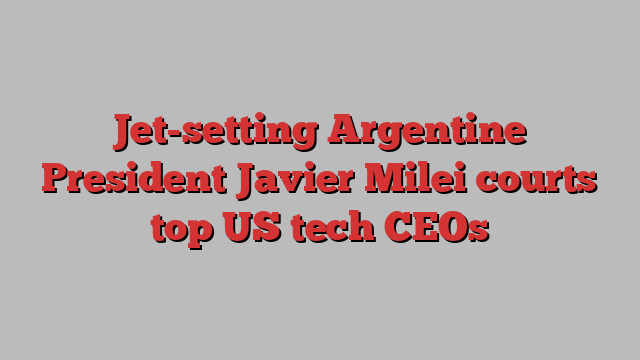
Unlock the Editor’s Digest for free
Roula Khalaf, Editor of the FT, selects her favourite stories in this weekly newsletter.
Argentina’s Javier Milei will meet tech executives including Tim Cook and Sam Altman in California this week, marking the libertarian president’s fourth trip to the US in five months as he seeks to build hype for his economic reforms.
Milei will spend Tuesday to Friday in San Francisco, meeting business leaders including the Apple and OpenAI chief executives, Google CEO Sundar Pichai and Meta chief Mark Zuckerberg, the president’s office said on Monday.
His spokesperson said the trip was designed “to position Argentina in the world once again”. The Latin American country’s tech sector is one of the region’s largest.
Milei has travelled extensively since taking office in December, courting the global spotlight via friendships with rightwing figures such as Tesla chief executive Elon Musk, who he met at the carmaker’s Austin factory in April, and giving fiery conference speeches defending his free market “anarcho-capitalist” beliefs.
By the end of June he will have completed eight foreign tours — a record for Argentine presidents in their first six months in office, per newspaper La Nación. None have been within South America.
Opposition politicians have criticised Milei’s travel, and three lawmakers have asked police to investigate his officials for using public funds on a trip to a far-right political conference in Spain, which they argue was made in a personal capacity.
For many Argentines, roughly half of whom approve of Milei’s government, his global profile has been a “novelty”, said Cristian Buttié, director of pollster CB Consultora.
“We are not used to Argentine presidents being famous internationally; for young voters the photos with Elon Musk have a certain allure,” he said. “But the question is: will that fame benefit Argentina, or will it just benefit Milei?”
Analysts said international businesses were likely to hold off on investing in Argentina, which is suffering its worst economic crisis in two decades. Annual inflation was running at 289 per cent in April and economic activity was down 8.4 per cent in March compared to a year earlier.
Milei has slashed government spending to halt the use of money printing and bring down inflation. But he has yet to secure longer term reform in congress, where he controls fewer than 15 per cent of seats.
“Many, many years of a volatile investment climate have [badly damaged] Argentina’s international reputation,” said Kezia McKeague, managing director of McLarty Associates, which advises multinationals operating in Argentina. “You don’t change that in six months.”
“There is a great deal of excitement in some sectors, but companies aren’t ready to pull the trigger yet,” she said.
Negotiations are dragging on in the Senate over Milei’s first two bills, which include measures to cut the fiscal deficit and an incentive scheme for investments in mining and other sectors.
Musk and Milei discussed lithium, the key electric vehicle battery metal of which Argentina has some of the world’s largest reserves, when they met in April, according to the president’s team. But Musk did not announce any new investment.
The government also has yet to lay out its plan for removing Argentina’s strict currency controls, which limit companies’ ability to take profits out of the country, and whether or not it will pursue Milei’s controversial campaign pledge to replace the peso with the US dollar.
“There is a lot of inconsistency . . . which makes it impossible to plan investments,” said Fabio Rodriguez, director at consultancy M&R Asociados. “That’s what I’d want to hear about if I were an investor meeting with Milei, rather than socialism and capitalism and freedom.”